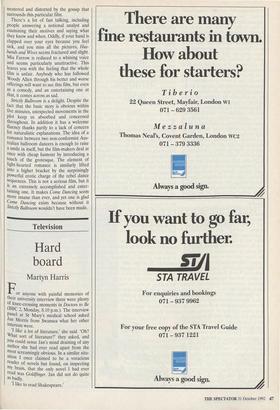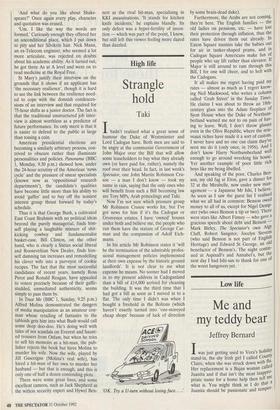Television
Hard board
Martyn Harris
For anyone with painful memories of their university interview there were plenty of knee-crossing moments in Doctors to Be (BBC 2, Monday, 8.10 p.m.). The interview panel at St Mary's medical school asked Jan Morris from Swansea what her other interests were.
`I like a lot of literature,' she said. 'Oh? What sort of literature?' they asked, and you could sense Jan's mind draining of any author she had ever read apart from the most screamingly obvious. In a similar situ- ation I once claimed to be a voracious reader of novels but found, on inspecting my brain, that the only novel I had ever read was Goldfinger. Jan did not do quite as badly. `I like to read Shakespeare.' `And what do you like about Shake- speare?' Once again every play, character and quotation was erased.
'Urn. I like the way the words are formed.' Curiously enough they offered her an unconditional place, which I put down to pity and her Silvikrin hair. Nick Mann, an ex-Telecom engineer, who seemed a lot more articulate, was rejected on doubts about his academic ability. As it turned out, he got three As at A level and went on to read medicine at the Royal Free.
St Mary's justify their interview on the grounds that it shows if an applicant has 'the necessary resilience', though it is hard to see the link between the resilience need- ed to cope with the donnish condescen- sions of an interview and that required for 75-hour shifts as a junior doctor. The fact is that the traditional unstructured job inter- view is almost worthless as a predictor of future performance. Its only merit is that it is easier to defend to the public at large than tossing a coin.
American presidential elections are becoming a similarly arbitrary process, con- trived to obscure rather than illuminate personalities and policies. Panorama (BBC 1, Monday, 9.30 p.m.) showed how, under the 24-hour scrutiny of the American 'news cycle' and the pressure of smear specialists (known now as 'oppositional research departments'), the candidate's qualities have become little more than his ability to avoid 'gaffes' and to buy off the noisiest interest group thrust forward by today's schedule.
Thus it is that George Bush, a cultivated East Coast Brahmin with no political ideas beyond the purely managerial, finds him- self playing a laughable mixture of shit- kicking cowboy and fundamentalist basket-case. Bill Clinton, on the other hand, who is clearly a Sixties social liberal and Rooseveltian New Dealer, finds him- self damning tax increases and remodelling his clever wife into a purveyor of cookie recipes. The fact that the most successful candidates of recent years, namely Ross Perot and Ronald Reagan, have appealed to voters precisely because of their gaffe- studded, unmediated authenticity, seems simply to pass them by.
In Trust Me (BBC 1, Sunday, 9.25 p.m.) Alfred Molina demonstrated the dangers of media manipulation as an amateur con- man whose retailing of fantasies to the tabloids gets him into what Bush would call some deep doo-doo. He's doing well with tales of sex scandals on Everest and haunt- ed trousers from Oxfam, but when he tries to sell his memoirs as a hit-man, the pub- lisher rejects the book but hires Molina to murder his wife. Now the wife, played by Jill Gascoigne (Molina's real wife), has hired a hit-man of her own to murder her husband — but that is enough, and this is only one of half a dozen contending plots.
There were some great lines, and some excellent cameos, such as Jack Shepherd as the witless security expert and Hywel Ben- nett as the rival hit-man, specialising in KKI assassinations. 'It stands for kitchen knife incidents,' he explains blandly. Its only defect was a hyper-fertility of inven- tion — which was part of the point, I know, but still left this viewer feeling more dazed than dazzled.



























































 Previous page
Previous page